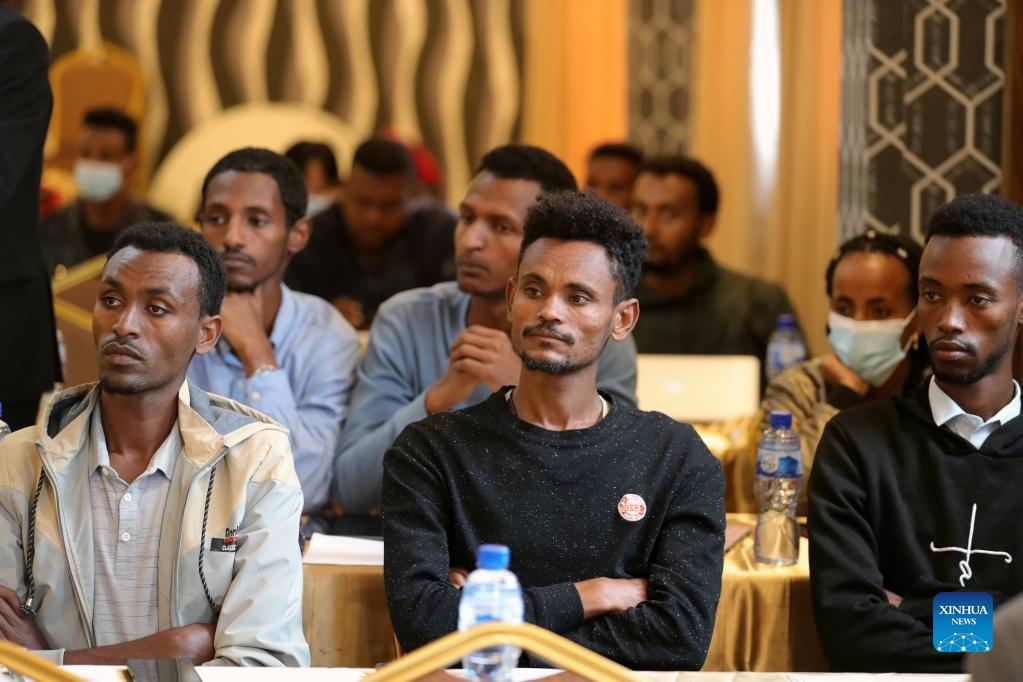Feature: Special initiative offers Chinese language education for school children in Ethiopia

Tola Beriso, head of the Oromia Education Bureau, speaks during the opening ceremony of summer training for Ethiopian Chinese language teachers in Addis Ababa, Ethiopia, on July 29, 2022. (Xinhua/Wang Ping)
ADDIS ABABA, Aug. 2 (Xinhua) -- Ayele Tadesse, a teacher at the Nedjo special boarding school in Oromia regional state of Ethiopia, spoke highly of exposing students to Chinese language studies at an early age.
Tadesse, who studied the Chinese language at the Hawassa University in southern Ethiopia, has been teaching the Chinese language to some 88 students across three classes at the Nedjo special boarding school for the past close to eight months.
"Teaching the Chinese language to school children is really an interesting thing. They are unbelievably fast in learning the language while also very active in the classroom," Tadesse told Xinhua recently.
The school is one of nine special boarding secondary schools in the Oromia region of Ethiopia, where students are given the chance to voluntarily choose from Chinese, Arabic and French.
Tola Beriso, head of the Oromia Education Bureau, said in line with China's growing global power, teaching the Chinese language to school children would further propel their future opportunities.
"In these nine boarding schools, we enrolled high-caliber students. In addition to other subjects, students are taking Arabic, Chinese and French languages based on their preferences. We have about 1,522 students, of whom 305 have already selected the Chinese language," Beriso told Xinhua.
Given that Chinese language education has been mostly available for students at the university level in Ethiopia, Tadesse believed that the rare opportunity would enable secondary school students to learn the language easily at a younger age.
"Teaching the Chinese language at secondary school level is such a rare opportunity not just to let students learn the language but also to have the opportunities that are presented in having learned the Chinese language. It is a very good opportunity for these students," Tadesse said.
Milky Tolemariam, a Chinese language teacher from the Bishoftu secondary special boarding school, also emphasized the crucial role of exposing secondary school students to the Chinese language.
"Over the past seven months, I have noticed that the students are very active as they start learning the Chinese language earlier than how we started learning the language late at the university level," Tolemariam said. "It is a very good initiative because these young children will grow to become the future of this nation. Hence, teaching them the Chinese language at this age would further enable them toward becoming the connecting bridges between our two peoples."
Tolemariam is now undertaking a summer camp of Chinese language training for Ethiopian teachers in Addis Ababa, the Ethiopian capital, along with eight other local Chinese language teachers including Ayele Tadesse. The summer camp is organized by the Oromia Education Bureau in partnership with the Confucius Institute at Addis Ababa University (AAU). Tolemariam said such opportunities enable both teachers and students to deepen their understanding of the language.
"Summer camp and other similar opportunities are greatly contributing to active learning of the language. Similar summer camp opportunities had been also previously organized, enabling students and teachers to go to China for a few weeks to learn the language," Tolemariam said.
Che Zhaoguang, the cultural counselor at the Chinese Embassy in Ethiopia, said at the opening of the week-long summer camp Friday that educational cooperation is playing an important role in promoting the understanding and friendship between the two countries.
"Learning the language of each other will have a positive impact for deepening cooperation in education, culture, tourism, societies, economics and other aspects of the two brotherly countries," said Che.
According to Beriso, as language contributes to deepening the people-to-people relations between the two countries, teaching the Chinese language would further strengthen the already blossoming people-to-people ties between the two countries. "I think teaching our children the Chinese language is very important. We are also sending students to China for (study with) scholarships. So, I think it is important to strengthen the people-to-people relationship in this regard."
In addition to the AAU in the Ethiopian capital of Addis Ababa, the Chinese language is now provided as a general interest course or an academic major in many other public universities across Ethiopia, including the federal Technical and Vocational Education and Training (TVET) Institute, Bahir Dar University in Ethiopia's northwestern Amhara regional state, Hawassa University in Southern Ethiopia as well as Arsi University in Ethiopia's largest Oromia regional state.
The Confucius Institute in AAU, which started operation in Ethiopia in 2012, has so far registered more than 10,000 students who passed through various levels of Chinese language studies. Among them, more than 100 were able to get their bachelor's degrees in the Chinese language, according to figures from the institute.
As a growing number of Ethiopians opt to study the Chinese language, AAU has recently announced that it has finalized preparations to launch its first-ever program, titled Master of Teaching Chinese to Speakers of Other Languages (MTCSOL), in the East African country.
According to the Confucius Institute at the AAU, the MTCSOL is a two-year, full-time program, in which students study core lessons based at the AAU in the first year, and qualified students will receive further education in Chinese language teaching at Tianjin University of Technology and Education in China.

Local Chinese language teachers attend the opening ceremony of summer training for Ethiopian Chinese language teachers in Addis Ababa, Ethiopia, on July 29, 2022. (Xinhua/Wang Ping)
Photos
Related Stories
- Feature: Backpack-bikers transform food delivery in Ethiopia's capital
- China-funded Luban Workshop to modernize industrial workforce in Ethiopia
- Commuters in Ethiopia face transportation headache amid fuel price hike
- Ethiopia, UN sign agreement for rehabilitation of war-torn northern region
- UN calls for addressing food insecurity in Ethiopia's conflict affected parts
Copyright © 2022 People's Daily Online. All Rights Reserved.









